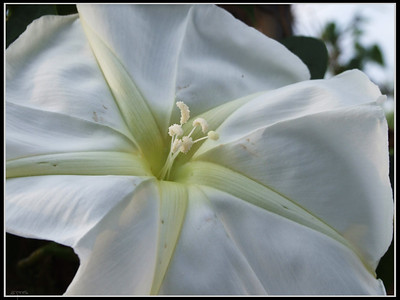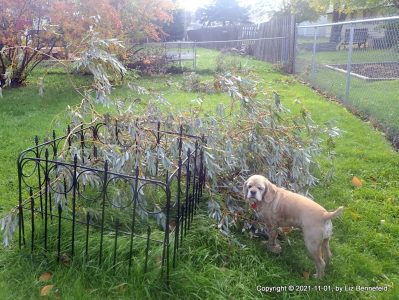
soft moonlight
midnight's gentle breeze
melted snow
Copyright © 2022-02-12, by Liz Bennefeld.
Image: “Ipomoea alba – לפופית לבנה” by Eran Finkle is licensed under CC BY 2.0.

soft moonlight
midnight's gentle breeze
melted snow
Copyright © 2022-02-12, by Liz Bennefeld.
Image: “Ipomoea alba – לפופית לבנה” by Eran Finkle is licensed under CC BY 2.0.
the (r)age of fire
lightning torches thirsty trees
nowhere left to hide
[senryu.] Copyright © 2021.11.01 by Liz Bennefeld.
autumn’s reds and golds
dry leaves crumble underfoot
evening fades to night
[haiku.] Copyright © 2021.11.01 by Liz Bennefeld.
As I understand it, unlike haiku, senryu don’t have a cutting or seasonal word. The structure of senryu is usually three lines with 17 or fewer syllables (e.g. 5-7-5), like haiku. It addresses human issues/affairs rather than nature. (Emotions rather than the senses, maybe?) Also, a haiku length that is coming more into use is ~11 syllables (3-5-3), putting them more in sync with the content volume of a haiku written in Japanese.

weeds overgrow the garden
the vegetables are picked
waiting for the snow to fall
winter's time to rest
Copyright © 2021-11-01, by Liz Bennefeld.
The dodoitsu is a Japanese poetic form: 7-7-7-5. Usually focuses on love or work, frequently with a comical twist.
Double Isolation
Standing on the inside,
looking out—
at those on the outside,
looking inThrow open the windows,
unlock the doors
tear down the walls’til everyone can touch
and everyone can hear.
Copyright © 2021-05-02, by Liz Bennefeld.
Image by Angelika Graczyk from Pixabay
early autumn dusk
quiet settles on the woods
pop of burning logs
cold snows brush the windows
an almost-winter lullaby
Copyright © 2020-11-02, by Lizl Bennefeld.
Photo by WantTo Create on Unsplash
night’s moonbeams reveal
visions hidden by daylight
vanished with dawn’s mist
wee fairies in their snow boots
gathered round a glowing coalsome swing from dead stems
into snowdrifts thrice their height
some gathered flower petals
layered thick for cushions
their fragrance fills the airon the shortest day
the longest night of winter
cling close for the warmth
after all the winter storms
it will once again be spring
“Fairy Winter”. Copyright © 2020-11-01, by Elizabeth W. Bennefeld.
Image by Ulrike Leone from Pixabay

Survival Guide (Enumeratio Poem)
I love enumeratio poetry! I decided just to have fun with this, and made a numbered list in response to the prompt. As an aside, here: I have been writing (and referring to) survival lists/guides ever since I started journaling sometime in the early sixties, while I still was in high school. As I finished each journal, I would copy my list into the new one, go through the old one to pull out the “creative writing” pages, and then shred or burn the old journal. I quit doing paper journals around beginning of this century.
Write yourself a survival guide as a list poem: What are the things you need to know to survive? What should you have known? What do you need to remember? What do you know that only you can tell yourself? What items do you need? What actions do you need to take? [Sarah Tatro, Poetry Super Highway]
Survival Guide:
Things I decided, at one time or another, that I knew
and needed to remember
(a recent edition)
1. Nobody knows the answers. Everyone is making it up as they go along.
2. It’s better to screw up making your own mistakes than making someone else’s.
3. Make a list of what you know and, if possible, why you think you know it. Then make decisions on the basis of that list, not on what you want to be real, when you’re going crazy.
4. God understands your messes, and they don’t bother Him. He doesn’t confuse them with what or who you are, and neither should you.
5. Gain or loss, pleasure or pain, discovery or routine, sickness or health, friends or isolation, life or death. There are no guarantees or promises concerning these, life’s incidentals. And, they don’t count.
6. You are not alone. You are always loved. You are loved and valued neither more nor less than any and every other living being in creation. You are cared for. Always. No matter what.
7. Act justly, observe appropriate opportunities to perform acts of loving kindness, walk discretely with God, and with everyone else. As one among all the others.
8. We are all equally responsible. God is the One who’s capable.
9. You will never come to the end of things you do not know, or, knowing, things you do not understand. That’s not in your job description. You are responsible to give and receive love.
10. You have a profound purpose in life. You achieved it sometime before you turned twenty (or 10 … or whenever), and you’ll never know what it was. Everything since then has been gravy.*
Copyright © 2017-04-25, by Lizl Bennefeld. (For 2017’s NaPoWriMo Event)
*”everything else is gravy” = extra or beyond what’s expected or necessary in a good way.